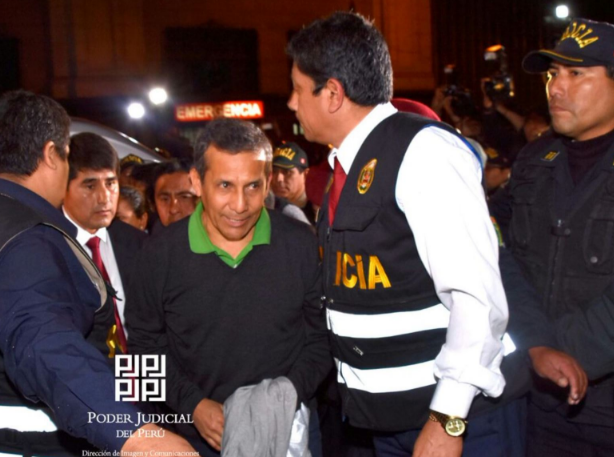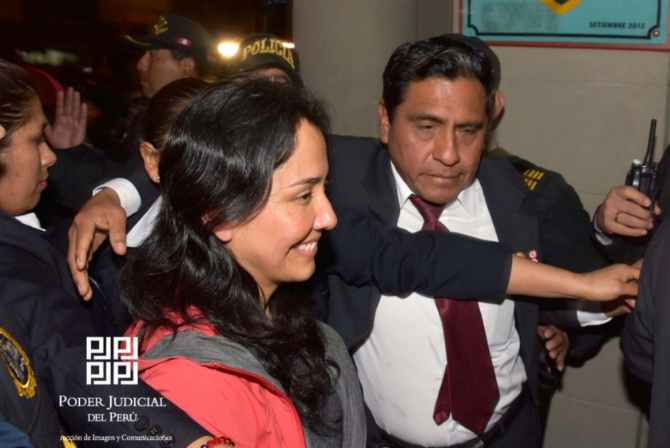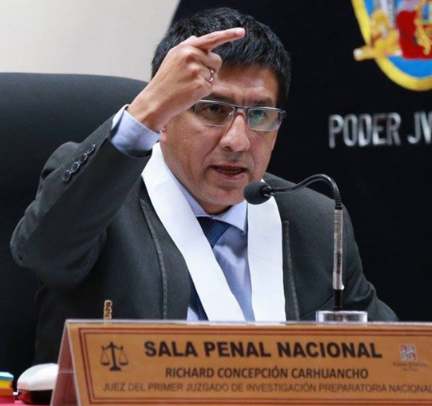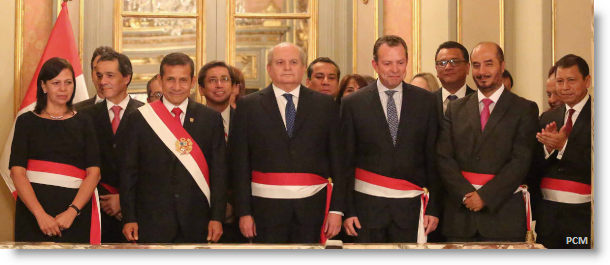
Former President Ollanta Humala and his wife Nadine Heredia were sent to prison on Friday afternoon, to serve an 18-month preventive imprisonment term while investigations continue into allegations of corruption and money laundering. Investigations have been ongoing for at least two years and are likely to continue for at least another year.
Their defense lawyers filed appeals on Friday for their release, and a decision by the appellate court is expected in two weeks.
The district attorney for money laundering, German Juarez, requested the temporary custody, which was granted by Justice Richard Concepcion on the grounds that the Humalas could obstruct ongoing investigations and also pose a flight risk.
After 16 hours of hearings on Wednesday, ending at 2 am, Justice Concepcion spent close to six hours on Thursday afternoon to explain the reasons for granting the request for imprisonment.
The Humalas, who did not attend the two days of court sessions, then drove from their home to the criminal court to hand themselves in, and from there were taken by police to the temporary detention center in the basement of the Palace of Justice. On Friday afternoon, Heredia was taken to the Virgen de Fatima women’s prison in Chorrillos, in south Lima, while Humala was flown by helicopter to the Police Special Forces Division, DIROES, in Ate, in east Lima.

Despite initial speculation, Humala is not sharing quarters with former President Alberto Fujimori, who is serving a 25-year sentence at the police compound for crimes against humanity. Instead, Humala has been placed in a separate unit.
“Humala deserves to be treated as well as Fujimori,” said Wilfredo Pedraza, defense attorney for Heredia and a former minister of Interior during the Humala administration. Fujimori occupies a three-bedroom apartment in the police compound and privileges include few if any limits on visitors.
The judge’s decision was not unexpected but has caused an impact nonetheless. The Humalas have two young teenage daughters and a six-year old son, who are now in the custody of their grandmother, Heredia’s mother.
“It’s a historical decision, certainly, but what’s happening is very sad,” said President Pedro Pablo Kuczynski. “I hope that Mr. Humala and his wife’s process will proceed quickly and transparently. I hope it is quick because this issue of preventive imprisonment, as you know, is a very contested issue.”
Justice Concepción has not been known to ever turn down requests for preventive imprisonment —he has already issued a similar order on former President Alejandro Toledo, who is in the United States — but critics, including political analysts and some of the city’s top lawyers, say that in the Humala case the reasons are weak and unsubstantiated.
Former State Prosecutor Julio Arbizu considered the district attorney’s focus on possible new criminal evidence was strong but that his allegations on the dangers the investigation process might face were poor.

The four main reasons highlighted by Justice Concepción are: flight risk — the D.A. considered a recent trip abroad by the Humala daughters with their grandmother to be a sign of future family plans; obstruction of investigations — the D.A. cited an alleged bribery of witnesses by Ollanta Humala in a separate case of military abuses in Madre Mia during the Shining Path conflict, even though that allegation was rejected by the court in a trial that has already concluded; receiving campaign donations from Venezuela in 2006 and Brazil in 2011, the latter a total of $3 million via Odebrecht; and money laundering.
Nadine Heredia’s defense attorney, former Interior minister Wilfredo Pedraza, argues that a flight risk does not exist because both Humala and Heredia have never failed to appear at hearings or interrogations, and that Heredia immediately returned last year from Geneva, where she was to work with FAO, when a Lima court ruled she had to report to the court once a month during the investigations.

Twenty-seven men and women who served as cabinet ministers during Ollanta Humala’s administration have issued a statement to say that the preventive imprisonment has no justification.
“After 30 months of investigation, without any formal accusation made, it was resolved to order preventive imprisonment despite the impeccable procedural behavior of the Humalas, making this change unjustifiable,” stated the former ministers, led by Pedro Cateriano, who was Defense minister and later Premier in Humala’s administration.
Political and legal analyst Rosa Maria Palacios points out that there are no laws in Peru that limit foreign donations or amounts of donations, and there is no restriction on how the money is spent — whether on the campaign itself or on cars or property for the candidates. It might be ethically questionable, says Palacios, but it’s not illegal. Also, the tax office, Sunat, does not require that political parties file returns on those donations. Bills to regulate campaign financing have been put forward in Congress several times but lawmakers have shown little interest.
In fact, all leading candidates have received campaign donations from abroad at least in the past two presidential elections — Marcelo Odebrecht, jailed CEO of the huge Brazilian firm that is now caught up in corruption scandals worldwide, told Brazilian and Peruvian district attorneys recently that his firm gave money to the Humalas and also to Keiko Fujimori and most probably to Alan Garcia.
D.A. German Juarez has also focused on money laundering investigations but so far there is no evidence that the Humalas have received illicit money, nor are there any links so far to any third party wanting to launder money. Heredia has set up two firms with part of the Brazilian donation, but that is permitted since there are no restrictions on campaign financing expenditures.






Something really stinks about this imprisonment of any person in Peru, suspected of committing a crime. You are guilty, until you prove your innocence. It seems Humala will not receive a fair trial. Will Humala receive financial compensation for serving 18 months in prison, if the charges against him are proved false, or have no basis in law. Is this sentencing Humala to prison, a left over from the middle ages legal process, or an attempt to clear the field of candidates, for the next presidential election. I have no idea if Humala and his wife are guilty of a crime or are innocent. They should be allowed to defend themselves, as every person in Peru should have that right, to a fair trial.
Today there is news that a “Procurador” or State’s Attorney, has begun an investigation aimed at bank accounts owned by president Kuczynski in foreign tax havens, accounts where funds have been deposited, she stated, in connection with the Odebrecht corruption scandal, and that she, and her superior, the head of the “Procuraduría,” have been dismissed by the Minister of Justice. The Government’s defense in this scandal, by the Minister of Justice, is focused on the “Procuradora’s” handling of the process to secure compensation for the State in the matter of Odebrecht’s corrupt practices in Peru, and on Chinchero contract, the messy and probably corrupt contract for the construction of the Cusco airport, in what seems to me, to be a shameless effort to launch a smoke screen to distract the public hoping to slip this smoking gun under the rug. Something is definitely rotten in Denmark. I hope I’m wrong.
Please remove this comment!